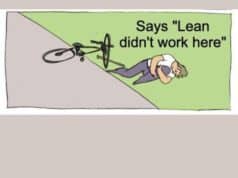SignOnSanDiego.com > News > World — Russia probes claims medics tied toddlers to beds
I hope nobody finds this to be too insensitive of an example… it's obviously not good what happened to these toddlers. But, I think it's instructive as an example of non root cause problem solving.
Russian prosecutors said on Friday they were investigating reports medical workers in a hospital near Moscow tied children to beds to avoid having to look after them.
Major Russian television channels ran amateur video footage this week showing toddlers tied up.
Tying the children up was not the “root cause” solution to the staff being overworked/understaffed. We could have a long discussion about “why” this happened. One thing I've been trying to be better at is thinking “why” and not blaming. As much as I preach about it, I'm not always 100% good about that myself.
Why would employees tie the children up? Because they're bad people? Probably not. Are the employees overworked because management isn't staffing enough employees? Is management being held to some unattainable financial goals, preventing them from having the right staff?
Lots of “whys” get you to something different than simply blaming an individual. But that brings up an interesting question: at what point is personal responsibility the key and when can you blame the system? Do we have responsibility as individuals to say “no, system, this isn't acceptable?” If that means having to quit your job, that isn't something most of us can do.
Thoughts?
What do you think? Please scroll down (or click) to post a comment. Or please share the post with your thoughts on LinkedIn – and follow me or connect with me there.
Did you like this post? Make sure you don't miss a post or podcast — Subscribe to get notified about posts via email daily or weekly.
Check out my latest book, The Mistakes That Make Us: Cultivating a Culture of Learning and Innovation:










“No, system, this isn’t acceptable” is the exact reason I’m a vegetarian/wanna be vegan. I dislike that system so deeply that I cannot participate in it.
It’s also the reason I’d never accept a job in an obviously non-vegetarian friendly industry (no running process improvements in meat packing for me). My personal decision is that I cannot support that industry in any obvious way.
Life is complicated, so I’m sure there’s all sorts of places I’m unknowingly supporting it(or supporting companies that are doing equally heinous activities).
But even accepting that convolution, people still do amazingly awful things just because it’s accepted (what are you tolerating, thus promoting? again). I can almost see someone thinking ‘they’ll be safer if they’re gently restrained here than if they’re wandering around unsupervised…’ or something similar the first time someone tied a toddler up. Then after it was accepted the first time, other people did it, because it was ok.
I’m finding out that questioning your assumptions about what is “ok” and what isn’t is one of those hard steps that needs to be done for real change to happen. Just throwing out “how could you?” certainly does nothing. Assuming you know the answers is probably even worse.
Interesting topic, I hope more people will comment.
Andrea